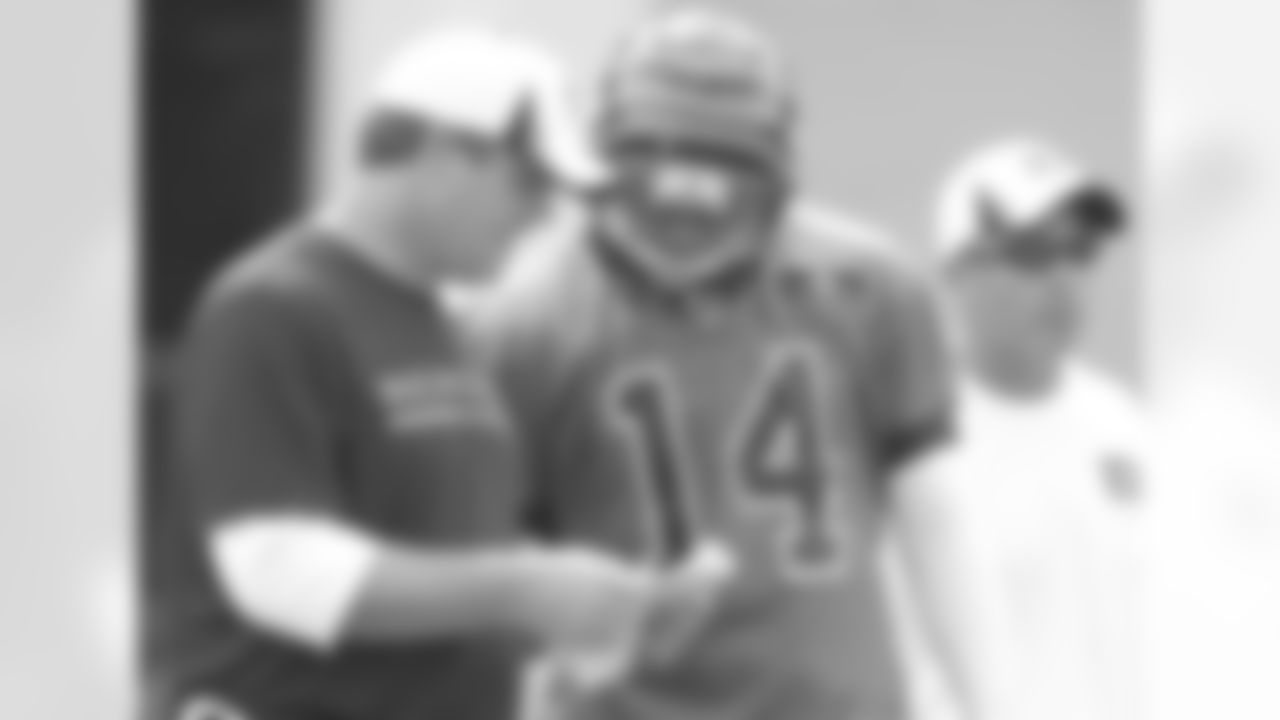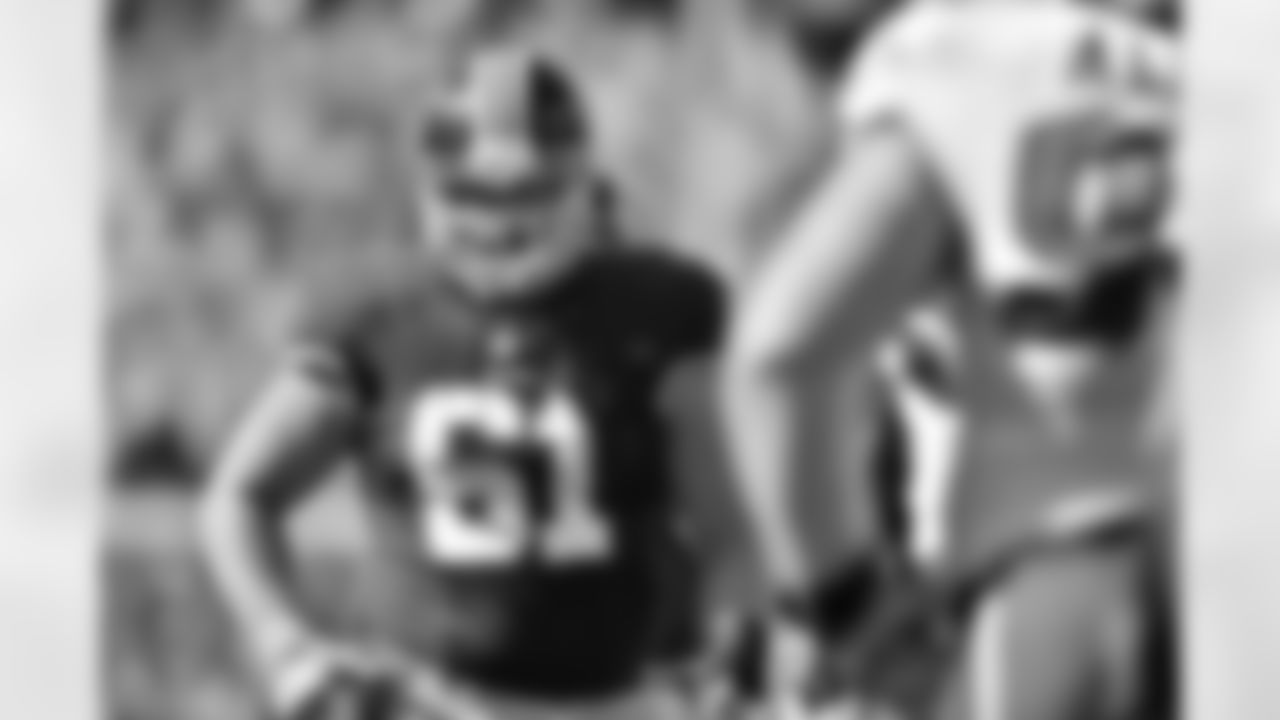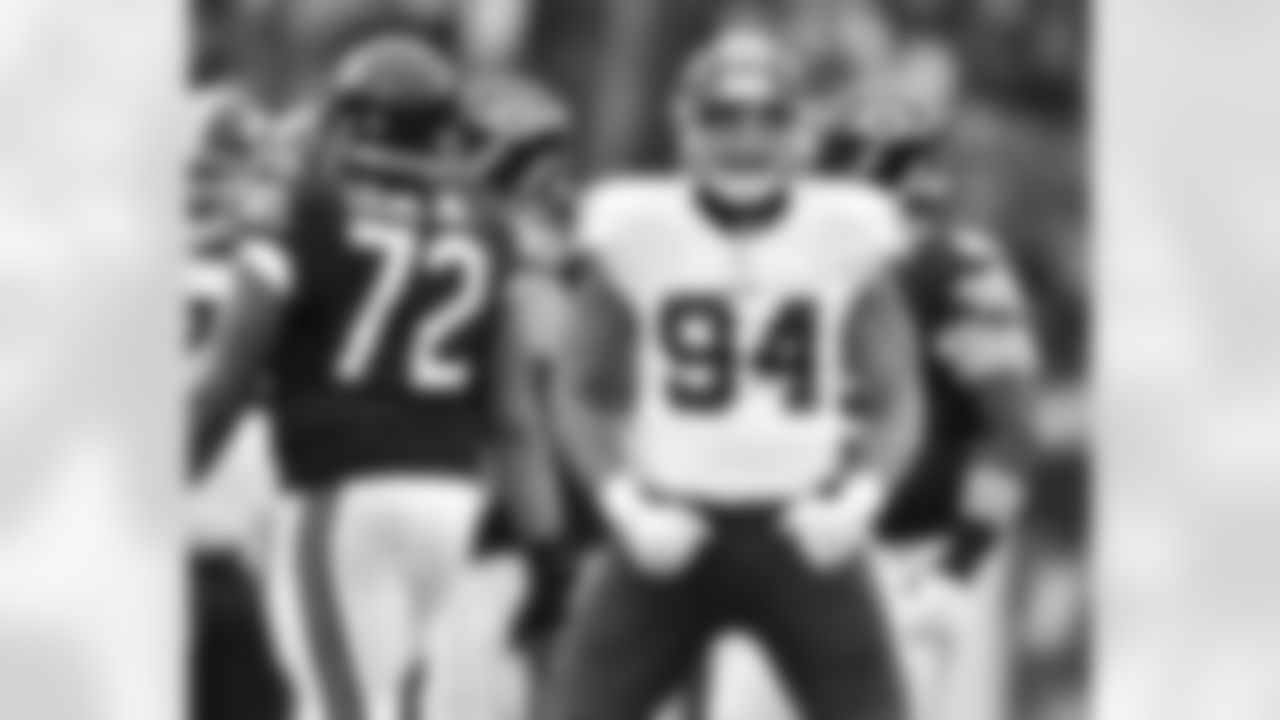Redskins head coach Jay Gruden's roots in calling plays dates back to his days in the AFL. Now back in the role of play caller, Gruden, former colleagues and current players reflect on his success.
The Nashville Kats were on their way to winning the Arena Football League's Eastern Division in the summer of 1997. Jay Gruden, a 30-year-old rookie offensive coordinator with a head of shaggy brown hair, a bright smile and puffy cheeks, toiled along their sidelines.
Check out these photos of Head Coach Jay Gruden from 2016.
















Nashville's defensive coordinator Pat Sperduto, a longtime friend and former teammate of Gruden's, walked over to talk before a game. In his hand, Sperduto clutched his call sheet, meticulously organized with plays for different personnel groupings and downs and distances, all typed up and laminated.
"Hey, where's your call sheet?" Sperduto asked Gruden.
Gruden sunk his hand into one of his pockets and retrieved a crumpled page of yellow legal paper. Grinning, he presented it to Sperduto.
"What is that?" Sperduto said.
"Oh, just some plays for me to remember," Gruden replied.
A few scribbled notes were all Gruden needed to supplement his gut and an almost photographic memory for football plays.
"He just has 'it,'" says Sperduto, now a scout for the Kansas City Chiefs. "Whatever 'it' is — as far as just a feel and an understanding — it's pretty impressive."
"It" passes through Gruden's synapses on Redskins Sundays now.
When the Redskins kick off their 2017 season on Sunday at FedExField against the Philadelphia Eagles, Gruden will again be calling the plays on offense, after letting Sean McVay handle those duties the past two years.
Led by its passing game, Washington has had back-to-back winning seasons for the first time in two decades and yet, it seems the organization could be heading in any direction. Last year, the defense was among the league's worst. The Redskins missed the playoffs. Kirk Cousins' future with the franchise remains uncertain.
If Gruden can keep Washington's offense near the top of the league for a third-consecutive year, that "it" factor might become the most compelling reason for Cousins to stay.
Gruden's life has prepared him well for this task. He began cataloging route concepts in his mind as a kid, watching Joe Montana run Bill Walsh's offense. Over more than three decades of playing and coaching in college, the Arena League and the NFL, he developed quick pattern recognition. In hundreds of conversations with his brother Jon — in the driveway, on the phone, and from the press box into Jon's earpiece on the Tampa Bay sideline — he spitballed ideas for how to break a defense.
There are traces of all those experiences in Washington's offense today.
The origins of a Gruden offenseGruden got to see the West Coast offense revolutionize the NFL in real time. In 1977, he watched Montana quarterback Notre Dame to a national championship when his dad, Jim, was a running backs coach for the Irish. In 1982, after Jim moved the family to Tampa for a job with the Buccaneers, Jay still had a close tie to Montana through Freddie Solomon, the 49ers wide receiver (and the primary target on "The Catch") who spent his off-seasons there.
As a high schooler with NFL ambitions, Gruden spent his offseasons working out with Solomon, learning the same lessons in fundamentals, quarterback play and route-running that Solomon, a former quarterback, was getting from Bill Walsh the other seven months of the year.
"It was through their Super Bowl runs," Gruden says. "Freddie Solomon was there, Jerry Rice. But Joe Montana was the main guy, he and Bill Walsh were the guys that I really studied and followed because that's who we wanted to win, you know?"
Gruden's time in the AFL helped him think creatively about play design and hone his innate ability for calling games, but he says the spacing of the field — about a third of the size of a regulation field — is so different from the "outdoor game," that the schematics don't transfer over. Instead, Gruden inherited the "core concepts and fundamental beliefs" of the Redskins passing game, and some of the running game from his brother's coaching tree.
"The Paul Hacketts and Mike Holmgren and obviously Bill Walsh, all those guys that [Jon] learned from and he used, I learned from him and were engraved in my head," Gruden says.
Watch the Redskins this season and you'll still see a lot of quick passes, high-percentage throws and three- or five-step drops. You'll see Gruden get his running backs involved in the passing game. In an average season, his NFL offenses have thrown 83 passes to running backs and gained 518 yards on those plays.
"They're going to hit all areas of the field. You know, we're going to get screens, nakeds, boots, all the things that come off the running game," said Bengals coach Marvin Lewis, the head coach in Cincinnati when Gruden was offensive coordinator there from 2011-13.
You'll also see concepts that Gruden has developed on his own, particularly in the deep passing game where he's come up with route combinations that are more Madden than Montana.
His designs have helped Cousins, who led the league with 4.85 air yards per passing attempt and completed 47.5 percent of passes that traveled 20 yards or further last season, grow from a game manager into an effective deep thrower.
That is, in part, a product of the personnel — you can't nickel and dime with DeSean Jackson — but Gruden has long been a clever architect with the deep ball.
"We had no vertical passing game [in Tampa] until he got here," Jon Gruden says. "I can remember Jay coming up with some routes — you can't just run a straight go route, you can't just run a deep cross every time, you have to come up with some different types of vertical passes — and Jay was really good at helping us do that."
Jon posits that the AFL did influence his brother schematically in at least one way. Receivers can't run out of bounds in the AFL because, when Jay played and coached, there were only inches of space between the sidelines and the hockey-style boards enclosing the arena. Running straight down the field wasn't a good option.
"You'd run right into the boards and break your neck," Jon Gruden says. "Know what I mean? But, you can start across the field, and then put your foot in the ground and then go back deep where you came from to the opposite pylon."
When Jon Gruden finally coaxed his brother into coaching with him in Tampa in 2002, Jay used his understanding of spacing and leverage to come up with all sorts of deep angles, routes called rage or star routes, or code reds.
"He came up with all these crazy vertical double moves that I certainly hadn't thought of," Jon Gruden says.
A long history of calling plays
This offseason, Gruden has fielded a legion of questions about his return to calling plays. His responses have contained traces of confusion and annoyance, like he's being asked over and over if he's comfortable breathing.
His brother's reaction is sharper.
Washington Redskins head coach Jay Gruden has coached professional football in three different leagues, winning championships at each stop. Have a look back at his illustrious career.

Gruden served as head coach of the Predators for nine seasons (1998-2001 and 2004-08), leading the Predators to four championship game appearances and two league titles as a coach.

Gruden coached for seven seasons (2002-08) with the Tampa Bay Buccaneers, earning a Super Bowl championship ring as an offensive assistant in 2002.

In 2010, Gruden assumed the roles of head coach and GM of the UFL's Florida Tuskers, leading them to their second consecutive championship game appearance.

In 2010, Gruden assumed the roles of head coach and GM of the UFL's Florida Tuskers, leading them to their second consecutive championship game appearance.

In 2010, Gruden assumed the roles of head coach and GM of the UFL's Florida Tuskers, leading them to their second consecutive championship game appearance.

In 2010, Gruden assumed the roles of head coach and GM of the UFL's Florida Tuskers, leading them to their second consecutive championship game appearance.

In 2010, Gruden assumed the roles of head coach and GM of the UFL's Florida Tuskers, leading them to their second consecutive championship game appearance.

In 2010, Gruden assumed the roles of head coach and GM of the UFL's Florida Tuskers, leading them to their second consecutive championship game appearance.

Gruden spent the last three seasons as offensive coordinator for the Cincinnati Bengals.

Gruden spent the last three seasons as offensive coordinator for the Cincinnati Bengals.

Gruden spent the last three seasons as offensive coordinator for the Cincinnati Bengals.

In his tenure in Cincinnati from 2011-13, the Bengals averaged 10 wins a season, making three consecutive playoff appearances and earning an AFC North championship in 2013.

In his tenure in Cincinnati from 2011-13, the Bengals averaged 10 wins a season, making three consecutive playoff appearances and earning an AFC North championship in 2013.

In his tenure in Cincinnati from 2011-13, the Bengals averaged 10 wins a season, making three consecutive playoff appearances and earning an AFC North championship in 2013.

In his tenure in Cincinnati from 2011-13, the Bengals averaged 10 wins a season, making three consecutive playoff appearances and earning an AFC North championship in 2013.

Members of the Bengals' offense accounted for seven Pro Bowl selections in his three seasons in Cincinnati.

Members of the Bengals' offense accounted for seven Pro Bowl selections in his three seasons in Cincinnati.

Members of the Bengals' offense accounted for seven Pro Bowl selections in his three seasons in Cincinnati.

Excluding interim coaches, Gruden, 46, becomes the team's youngest head coaching hire since hiring eventual Pro Football Hall of Famer Joe Gibbs at 40 years of age in 1981.

Gruden was tasked with the development of quarterback Andy Dalton, a 2011 second-round pick.

In three seasons together, Gruden helped Dalton to a 30-18 regular season record as a starter (.625), as Dalton's 30 wins in that time frame ranked tied for fifth-most among NFL quarterbacks.

Excluding interim coaches, Gruden, 46, becomes the team's youngest head coaching hire since hiring eventual Pro Football Hall of Famer Joe Gibbs at 40 years of age in 1981.

Dalton's 80 passing touchdowns rank third-most in NFL history for a quarterback in his first three seasons, trailing only Dan Marino (98) and Peyton Manning (85).

Dalton's 80 passing touchdowns rank third-most in NFL history for a quarterback in his first three seasons, trailing only Dan Marino (98) and Peyton Manning (85).

Excluding interim coaches, Gruden, 46, becomes the team's youngest head coaching hire since hiring eventual Pro Football Hall of Famer Joe Gibbs at 40 years of age in 1981.

He becomes the first Redskins coach hired directly from an offensive coordinator role on another team since Norv Turner in 1994.

He becomes the first Redskins coach hired directly from an offensive coordinator role on another team since Norv Turner in 1994.
"If Jay Gruden's not as good a play-caller as anybody in the league, I mean, I disagree," Jon Gruden says. "I know what he knows, I know what he's done and I know what his role has been in Washington. It's not like he just stood there with his foot in his mouth the last two years. Come on. I mean, give me a break."
Gruden was the Redskins' offensive play-caller in 2014 before McVay was given that title and responsibility. He called plays in Cincinnati, too. Finding the start of Gruden's play-calling days, though, requires going back much further. Back even before he was on the sideline in Nashville. Back to when he was a player.
Gruden chose Louisville for college in part because of coach Howard Schnellenberger's prostyle offense, which asked a lot of him as a young quarterback. And when he was with the Tampa Bay Storm, coach Lary Kuharich insisted that quarterbacks call their plays.
"I don't know if there's many people out there that have that ability like Jay does where it just came so easy and so natural to him," says Sperduto. In addition to coaching with Gruden in Nashville, Sperduto was one of his linemen in Tampa Bay. As teammates, they won multiple ArenaBowl championships in the early 1990s. It was clear from being in the huddle with Gruden, Sperduto says, that he knew how to minimize an opponent's best pass rusher or motion to get a mismatch, and that it all came naturally to him at game-speed.
By the time Gruden was calling plays off crumpled sheets of paper in Nashville, he was already comfortable as a play-caller.
"He was very aware of everything that was going on in the game, and he knew how to attack personnel, knew a great deal about the opponent's personnel and where the weak spots were," says Ed Khayat, the former Redskins, Eagles and [Boston] Patriots defensive lineman who hired Gruden as coach of the Kats in 1997.
When Jay Gruden joined his brother's Buccaneers as an offensive assistant in 2002, he got a chance to use that awareness in the NFL game. Jon and Jay Gruden were connected by their headsets, Jon on the sideline and Jay watching from the press box, for seven years. Even in his first year with the team, Jay Gruden didn't hesitate to speak up during a critical situation.
Jon Gruden remembers one play, during Super Bowl XXXVII, which the Buccaneers won 48-21 against the Oakland Raiders, where Jay's "it" factor was on display. The Bucs were already up 10 points before halftime and, facing a first-and-goal from the Raiders' 5-yard line, Jay Gruden's voice shot into Jon's earpiece.
"Hey! Get to 374 Wasp!"
Jon Gruden called it. Bucs wide receiver Keenan McCardell split out wide to the right and ran a fly route right at Raiders cornerback Charles Woodson, then stopped. Quarterback Brad Johnson made the throw, and McCardell caught it over his back shoulder for a touchdown.
"It stung them pretty good," Jon says.
The task this year
Right now, the Redskins' future is murky. The offseason was defined by changes made to the defense, which must improve for the team to have success. But, if Washington remains in the playoff picture and posts a third-consecutive winning season, it'll likely be for the same reason as last two: they scored points.
Take a look at the Redskins' current 53-man roster in photos.

DL Jonathan Allen

LB Ryan Anderson

CB Bashaud Breeland

LB Zach Brown

RB Mack Brown

LB Chris Carter

G Tyler Catalina

LB Will Compton

QB Kirk Cousins

T.J. Clemmings

WR Jamison Crowder

TE Vernon Davis

WR Josh Doctson

CB Quinton Dunbar

S Deshazor Everett

LB Mason Foster

CB Kendall Fuller

LB Junior Galette

WR Ryan Grant

LB Josh Harvey-Clemons

CB Joshua Holsey

DL Ziggy Hood

K Dustin Hopkins

DL Matt Ioannidis

RB Robert Kelley

LB Ryan Kerrigan

DL Anthony Lanier

G Shawn Lauvao

C Spencer Long

DL Terrell McClain

QB Colt McCoy

S Stefan McClure

DL Stacy McGee

CB Fabian Moreau

T Morgan Moses

S Montae Nicholson

CB Josh Norman

T Ty Nsekhe

TE Niles Paul

RB Samaje Perine

WR Terrelle Pryor Sr.

WR Brian Quick

TE Jordan Reed

C Chase Roullier

G Brandon Scherff

LB Preston Smith

LB Martell Spaight

TE Jeremy Sprinkle

LS Nick Sundberg

S D.J. Swearinger

RB Chris Thompson

P Tress Way

T Trent Williams
Should those things happen, the comfort of an offense that's helped him pass for 4,000 yards in back-to-back seasons and a coach who has backed him and helped him succeed may be the Redskins' best chance to convince Cousins to stay.
It's not fair to put that all on Gruden, but what's fair is not always what's relevant at the Inova Sports Performance Center at Redskins Park in Loudoun County, Va. It's also not accurate to say that Washington needs only to recreate its offensive output of the last two seasons to have success.
"We've got to figure out a way to be balanced," Gruden says. "Not just at the beginning of the year but at the end of the year. I think sometimes when you have so many weapons, everybody's like 'Man, Jordan. Jamison. Josh. Terrelle. Just throw the ball every snap.' But I think our offense is best when we can run the ball, be physical."
Historically, Gruden hasn't been as pass-happy as his reputation indicates.
Only twice in the last six seasons has a Gruden offense ranked in the top half of the league by passing play percentage.
One of those seasons was 2016 in Washington, however, when the Redskins threw more often than all but seven other teams. That imbalance put up numbers, but it also led to problems, most acutely in the red zone. The Redskins were 30th in the league in touchdown percentage inside the 20-yard line where Cousins' completion percentage dropped from 67 to 45.78.
"I think Jay's one of those guys that's going to go off feel," says starting running back Rob Kelley. "If he feels like we're killing in the run game he's going to run it. If he feels like we're picking up in the pass game he's going to pass it. He's one of those guys where you've got to show him that you can stop it."
The Redskins will try to rededicate themselves to the ground game. If that succeeds, they hope it will help their play action game as well, a strength of Cousins'. Beyond those things, the Redskins offense won't look terribly different this year to the average viewer.
"It's always been Jay's offense at the end of the day," Cousins says. "So, even though Sean was involved in the past the fact that Jay is the one calling it now, there's not a lot of change because it was always Jay's system. And he was very involved in the game-planning and even in the game-day play calling decisions."
And yes, they will still throw the fade.
"I only called it like six times all year, for God's sakes," Gruden says. "It's just they were 0-for-6."
Self-deprecation aside, he's serious.
"Just watch Cincinnati tape," Gruden says. "The reason I'm sitting here today is because we threw the fade."
"He loves the fade," confirms A.J. Green.
A constant competitor
Gruden still uses the word "quit" to describe his decision to go into coaching. Back then, in 1997, his goal of playing quarterback in the NFL still felt within his reach. He had a young family to support, though, and wanted to give them security. Had he gotten hurt playing, he'd have lost his source of income.
Khayat offered him a $57,000 guaranteed salary as offensive coordinator in Nashville. Gruden took it.
Gruden is glad he made the choice to give his wife, Sherry, and their three boys stability. He was around to coach his sons' basketball teams and go to their school events. Still, stepping off the field was hard.
"I loved playing so much," Gruden says.
It was hard to walk away because it didn't make sense to Gruden that multiple AFL titles as a player hadn't gotten him more than a developmental squad stint with the Dolphins that was so short he never got a playbook.
"He's still bitter that he never got a shot in the NFL," Jon Gruden says. "I still think he's mad at me because I didn't sign him as a player. He said, 'What do you mean, coach? I'm better than Donald Hollas!' I can still hear him saying 'I can beat out Ty Detmer in Philadelphia!'"
Gruden's aw-shucks exterior sometimes masks this, but he's a competitor who sees everything as an opportunity to show he's a winner. Sperduto recalls 20-minute arguments over who called a "Jeopardy!" answer first. At the NFL Combine this March, Gruden sought him out in the stands of Lucas Oil Stadium and told him to download Words With Friends "so I can whoop your ass!"
Competitive banter has always been a hallmark of Gruden's personality. He's the same person he was in his 20s playing for the Storm, teasing Sperduto and his other linemen after they let him take a hit.
"You honestly felt guilty not protecting him to the fullest," says Sperduto, recalling the pit he'd feel in his stomach watching Gruden pick himself up off the turf. "You really felt like it was letting him down. I'm Italian, I've got that Italian mother guilt complex, he plays on that big time. Like, 'Don't worry, I don't need my back.'
"You'd feel so guilty!" Sperduto recalls.
As a coach, Gruden still motivates with that biting sense of humor. When Gruden came to Washington in 2014, some players mistook his easy demeanor for a lack of discipline or intensity. Now entering his fourth season, his contract extended through 2020, Gruden has grown comfortable being in control.
"I'm comfortable with people around me," Gruden says. "We have a great staff and I've gotten to know the players. My first year here I didn't know anybody, player-wise. Nobody. And they're set in their ways and 'Well, we didn't do it like this last year.' But I think everybody's gotten to know me a little bit more and I think everybody's more comfortable being around each other."
Now, the Redskins often describe Gruden as a player's coach. Most in the locker room feel a sense of loyalty to him. They say he hasn't forgotten what it's like to be in their shoes.
"When they don't succeed I take it hard," Gruden says. "I feel like I let them down."
There are complications to having "it." Expectations for the talented can lead to extreme personal demands. Did he do enough? Did he do it right? Even though he was the one to call for 374 Wasp, Gruden keeps his Super Bowl XXXVII ring locked away at home because he doesn't think his contribution earned it.
Dozens of people and thousands of hours have helped Gruden get to where he is now. His innate ability, along with a few disorganized notes, began his run from coaching for stability to chasing a Super Bowl ring he can call his own. He has formulated one of the league's top offenses as the primary mode to get there, creating both a benefit and complication with his starting quarterback. The upbeat presence of a rookie coordinator remains. It's the surroundings and demands that have changed.
Read more Washington Redskins coverage in The Washington Times: http://www.washingtontimes.com/sports/washington-redskins/.






